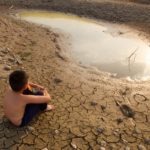Nobel laureates stand against climate change
Economists’ warnings about global warming are nothing new; their voices join those of scientists, ecologists, and international organizations. There are many Nobel Prize winners among those raising the alarm.

While scientific studies have been assessing the impact of the climate emergency and international agencies like the International Monetary Fund have instituted specific tax measures, for years Nobel Prize winners have been raising concerns from their recognized domains of expertise about the consequences of climate change.
For example, for almost four decades William Nordhaus, 2018 Nobel Laureate in Economics and recipient of the 2017 BBVA Foundation Frontiers of Knowledge Award, has been warning about the present and future impacts of global warming. Nordhaus, for good reason known as the father of climate change economics, created a model that describes the direct relationship between the economy and the climate.
Said model — the Dynamic Integrated Climate-Economy (DICE) and its variant, the Regional Integrated Climate-Economy (RICE) — measures, among other aspects, the positive effects a carbon tax can have on reducing the global temperature. According to Nordhaus, a high price must be applied to carbon in order to incent countries to use alternative energy sources, thus keeping global warming from rising the two degrees from pre-industrial levels, which is the maximum level established in the Paris Agreement.
"The main recipe to alleviate climate change is to make sure governments, corporations and households pay a high price for their carbon emissions. Today they pay practically nothing. If the price of carbon were higher, they would resort to other options, such as renewables", Nordhaus explains in his work.
William Nordhaus is not the only Nobel laureate to espouse a more sustainable economy. During a recent event in Spain, Nobel Prize winners, Edmund Phelps (Economic Sciences, 2006), Barry Barish (Physics, 2017), and Michael Levitt (Chemistry, 2013) agreed on the need to curb climate change by lowering CO2 emissions.

Edmund Phelps stressed that there are economically viable, even profitable, approaches to tackling the elimination of greenhouse gases, although he reiterated that the process is slow because the reduction in gases will occur while gases are still being emitted.
Barry Barish was more pessimistic: he believes the environmental crisis requires the effective elimination of the CO2 that we emit into the atmosphere, but this is a decision controlled by the economy, not by the will of the people.
Another Nobel laureate (for Physics in 2012), Serge Haroche from France, adds his voice to the topic. In his opinion, the numerous repercussions of climate change could "in the most extreme case” even lead to the “danger of nuclear war”.
In addition, eleven Nobel Peace Prize winners recently met in Yucatan where they made an appeal against climate change: "The greatest threat to world peace and humankind's survival is climate change; this is a certainty," Juan Manuel Santos, former president of Colombia and Nobel Peace Prize laureate in 2016 claimed.
In the same vein, Rigoberta Menchú (winner of the 1992 Nobel Peace Prize) apologized to Earth three times in an event that coincided with the global climate strike. "Forgive us for polluting you, for not taking care of you, for destroying you."